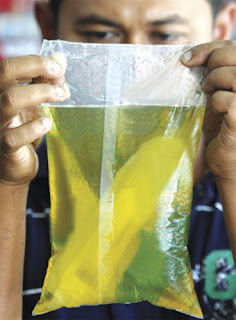 |
| Muslim refugees gather at Thechaung camp refugee camp upon arrival in Sittwe .Read history of Mynmar |
Victims of
Myanmar's latest explosion of Muslim-Buddhist violence fled to already
packed displacement camps along the country's western coast Sunday, with
a top U.N. official saying the unrest has forced more than 22,000
people from their homes.
State
television reported the casualty toll has risen to 84 dead and 129
injured over the past week in nine townships in Rakhine state. The
figures have not been broken down by ethnic group, but New York-based Human Rights Watch has said Rohingya Muslims bore the brunt of the unrest and the true death toll may be far higher.
On
Sunday, wooden boats carrying some refugees arrived outside the state
capital, Sittwe. The people trudged to the nearby Thechaung camp, a
place already home to thousands of Rohingya who took refuge there after a
previous wave of violence in June.
"I
fled my hometown, Pauktaw, on Friday because there is no security at
all," said 42-year-old fisherman Maung Myint, who arrived on a boat
carrying 40 other people, including his wife and six children. "My house
was burned to ashes and I have no money left."
Another Muslim refugee said she fled her village, Kyaukphyu, on Thursday after attackers set her home on fire.
"We don't feel safe," said
40-year-old Zainabi, a fish seller who left with her two sons, aged 12
and 14. "I wish the violence would stop so we can live peacefully."
Human
Rights Watch released dramatic satellite imagery of Kyaukphyu on
Saturday showing a vast, predominantly Rohingya swath of the village in
ashes. The destruction included more than 800 buildings and floating
barges.
There were no reports
of new violence Sunday. It was unclear what sparked the latest clashes,
but ill will between Muslims and Buddhists in Rakhine state
goes back decades and has its roots in a dispute over the Rohingya's
origins. Although many Rohingya have lived in Myanmar for generations,
they are seen as foreign intruders who came from Bangladesh to steal scarce land.
Today,
the Rohingya also face official discrimination, a policy encouraged by
Myanmar's previous military regimes to enlist popular support among
other groups. A 1984 law formally excluded them as one of the country's
135 ethnicities, meaning most are denied basic civil rights and are
deprived of citizenship.
Neighboring
Bangladesh, which also does not recognize the Rohingya as citizens,
says thousands of Rohingya refugees have sought to flee there by boat.
Its policy, however, is to refuse them entry.
Rights groups say Myanmar's failure to address the root causes of the crisis means the situation may get worse.
Over
the weekend, Border Affairs Minister Lt. General Thein Htay traveled to
the affected areas with the U.N. resident and humanitarian coordinator
in Myanmar, Ashok Nigam.
Nigam said 22,587 were displaced and they included both Muslims and ethnic Rakhine Buddhists, but he gave no breakdown.
Advertisement

























